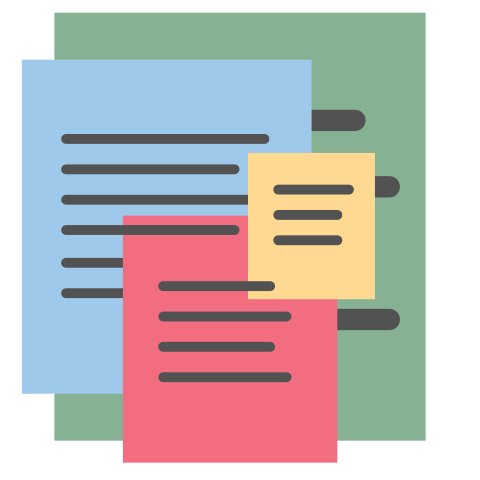Summary
This collection contains strategies for implementing formative assessment in the classroom. Formative assessment is a method of evaluating student learning throughout the learning process rather than just at the end. It enables teachers to identify areas where students need additional support and to adjust instruction to meet the needs of individual students. This type of assessment provides valuable, real-time feedback to both the teacher and the student. Using formative assessment regularly can increase student engagement and motivation as well as improve overall learning outcomes.Resources

How Am I Feeling? What Am I Thinking?
- 6th - 12th
Students self-evaluate or reflect on their learning and social-emotional status after exploring or engaging in a new topic or concept. This formative assessment can also double as an Exit Ticket. Read more »
- Individual
- Evaluate/Assessment
- Less Than 10 Minutes
- Reflection
- 6th - 12th

Lines of Agreement
- 6th - 12th
This formative assessment allows participants to select a claim and argue to defend their reasoning. This strategy can be used in a variety of ways to activate student thinking by supporting a claim with evidence. Read more »
- Whole Class
- Engage/Opening, Extend/Additional Learning Activity, Evaluate/Assessment
- 10 - 20 Minutes
- Activate Prior Knowledge, Analyze, Compare & Contrast, Conversation Starter, Critical Thinking, Physical Movement, Speak & Listen, Student Choice, Summarize
- 6th - 12th

My Favorite Mistake
- 11th - 12th
This formative assessment strategy enables teachers to evaluate student misconceptions while also helping them overcome the fear of failure. By celebrating the strengths within "wrong answers" and working out the correct answer as a group, teachers can strategically target students' understanding and... Read more »
- Whole Class
- Engage/Opening, Evaluate/Assessment
- Less Than 10 Minutes
- Analyze, Collaborate, Evaluate, Problem Solving, Reflection, Review, Self-assessment
- 11th - 12th

Stoplight Stickies
- Preschool - 12th
This strategy provides a formative assessment to gauge how confident students feel about their understanding of new content and/or their ability to put that new learning into action. Read more »
- Whole Class
- Engage/Opening, Evaluate/Assessment
- Less Than 10 Minutes
- Activate Prior Knowledge, Evaluate, Self-assessment
- Preschool - 12th

Tell Me Everything
- Preschool - 12th
In this strategy, students write down everything they remember about a topic or concept as a review, self-assessment, or foundation to build upon for future assignments. Read more »
- Individual, Whole Class
- Engage/Opening, Explain/Closing
- Less Than 10 Minutes, 10 - 20 Minutes
- Activate Prior Knowledge, Analyze, Elaborate, Evaluate, Identify, Organize, Reflection, Review, Self-assessment, Writing
- Preschool - 12th

What Are You Doing and Why?
- Kindergarten - Undergraduate
This instructional strategy is a quick formative assessment of your class's understanding of the purpose of a learning activity. The data collected in this quick check-in will tell you if the students are engaged, both hands-on and minds-on. Read more »
- Individual, Large Group (at least 30), Medium Group (at least 10), Small Group, Small Group (at least 4), Whole Class
- Engage/Opening, Explore/Learning Activity, Explain/Closing, Extend/Additional Learning Activity, Evaluate/Assessment
- Less Than 10 Minutes
- Active Engagement, Critical Thinking, Elaborate, Evaluate, Identify, Reason, Reflection, Self-assessment, Speak & Listen, Summarize, Synthesize
- Kindergarten - Undergraduate
This work is licensed under a Creative Commons CC BY-SA 4.0 License.
Report copyright infringement »

